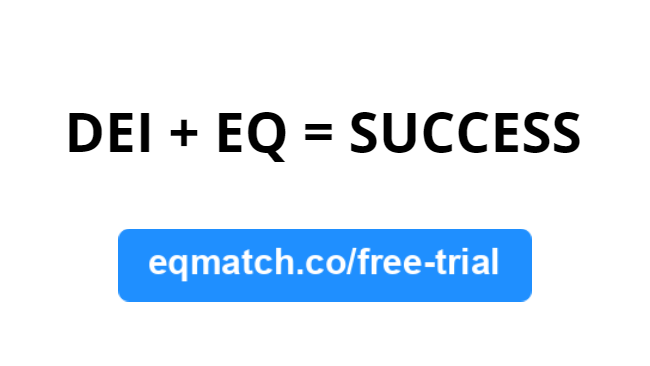Why care about diversity equity and inclusion in the workplace?
The business case for diversity equity and inclusion, or DEI, is stronger than ever. Human resource leaders understand the importance of DEI in building and maintaining a successful workplace.
The popularity and growth of diversity can also be assessed by the fact that Chief Diversity Officer positions grew 16.2% from last year (2020). Ecommerce giant Amazon grew its number of DEI positions by 44% over the past year, and Facebook grew its DEI positions by 28%.
Glassdoor research revealed that 67% of job seekers consider a diverse workplace an important factor when deciding to accept a position.
A 2019 report by McKinsey revealed that businesses that support and embrace diversity have a 25% higher chance of financially outperforming those that don’t. Naturally, more and more businesses are investing in DEI initiatives.
What are diversity equity and inclusion in the workplace?
Here are the definitions of diversity, equity, and inclusion (DEI).
Diversity is the presence of differences that may include race, gender, religion, sexual orientation, ethnicity, nationality, socioeconomic status, language, (dis)ability, age, religious commitment, or political perspective. Populations that have been-and remain- underrepresented among practitioners in the field and marginalized in the broader society.
Equity is promoting justice, impartiality, and fairness within the procedures, processes, and distribution of resources by institutions or systems. Tackling equity issues requires an understanding of the root causes of outcome disparities within our society.
Inclusion is an outcome to ensure those that are diverse actually feel and/or are welcome. Inclusion outcomes are met when you, your institution, and your program are truly inviting to all. To the degree to which diverse individuals are able to participate fully in the decision-making processes and development opportunities within an organization or group.

How Emotional Intelligence (EQ) can strengthen DEI in the workplace?
In a survey of about 100 founders, more than 95% stated that EQ in leadership is more important than IQ.
In the words of Daniel Goleman, “If you see a star-performing team, you’re seeing a very high group IQ. But what predicts the actual productivity or effectiveness of a team is not the potential—that is, the best talents of every person—it’s how people are valued on that team. It’s how people feel there’s harmony, that we get along, that we surface simmering issues, that we take time to celebrate, that we know each person’s strengths and that we step aside when it’s time for this person to come forward. In other words, that we are a team that has high emotional intelligence.”
Emotional Intelligence (EQ)is a powerful tool to implement diversity, equity, and inclusion in the workplace.
In the presence of high EQ leaders, complex discussions around race, gender, and other sensitive topics become feasible.
With help of emotional intelligence, both employees and leaders can better collaborate and utilize the diverse skills and experiences of their colleagues.
Here are some of the elements of Emotional Intelligence that aid diversity, inclusion, and equity.
Empathy
Empathy is the ability to sense other people’s emotions, coupled with the ability to imagine what someone else might be thinking or feeling.
Empathetic people can better understand what others are going through. They are also willing to help others to deal with the situation.
When dealing with differences in diverse groups, empathy serves as a crucial skill. Successful leaders in diverse groups exhibit high empathy.
Empathy plays an important role in change management, capacity building, and partnership building & collaboration.
Unconscious Bias/Implicit Bias
Put simply, these are attitudes present in a person’s subconscious, affecting the way they think and feel about people around them.
Many of us carry these biases since our childhood- absorbed through observing different environments such as social, and familial.
Implicit biases can affect our behavior by coloring our emotional and rational responses.
This kind of bias helps us make quick decisions. On the downside, it can pose a hurdle when dealing with complex social situations.
The sheer knowledge of unconscious bias is not enough to reduce workplace bias.
Emotional Intelligence can help alleviate the negatives of unconscious bias.
For instance, emotional self-awareness helps us become aware of conscious and unconscious biases.
Building an Inclusive Culture
Relationship management skills are key to creating an inclusive culture. As a predictor for multicultural competence, Emotional Intelligence plays a pivotal role in realizing an inclusive culture in the workplace.
Improving Mindfulness
Mindfulness in DEI is about welcoming differences. Through self-acceptance, we can be curious as against being reactive.
With mindfulness and acceptance, people in the workplace feel welcome.
They do not then have to worry about being judged- psychological safety.
Google’s Project Aristotle showed that psychological safety creates a sense of belonging, and paves the way for better teamwork
Constructive Thinking
Corporate leaders can benefit from constructive thinking to bring creativity, address disagreements, encourage cooperation & collaboration, and build trust across the organization.
Emotionally intelligent people have higher self-awareness, which translates into better leadership abilities, more empathy, improved critical thinking, better decision-making, and better emotional management.

There is enough research and evidence to show the correlation between Emotional Intelligence and Job Performance.
Dr. Goleman has rightfully said that “the more diverse the members of the team, the better its potential performance will be.”
A study conducted by Anne Neederveen Pieterse and her colleagues at Erasmus University, Rotterdam, showed that diverse teams performed better than homogenous teams.
The research pressed the idea that when people have high EQ are open to learning, diversity turns into a limitless resource.
Emotional intelligence (EQ) is one of the key aspects of building an effective team.
No wonder more and more leaders across the world are investing in Emotional Intelligence; diversity equity and inclusion in the workplace, to build a better, happier, and more productive workforce.




No responses yet